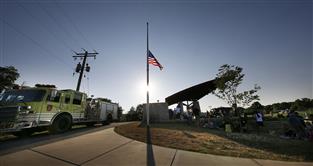Wauwatosa pastor defends political speech in federal court case
In a fight that has had hundreds of pastors pitted against the Internal Revenue Service for several years, a Wauwatosa pastor has thrown his hat in the ring, preaching politics in the pulpit and involving himself in a federal court case.
Wauwatosa-based Holy Cross Anglican Church isn't new to the spotlight. Previously known as St. Edmund's in Elm Grove, the congregation was the center of a losing legal battle to hang on to its previous property after it left the Episcopal Church in 2008.
"We went through a battle, but we're still alive and serving Christ," Patrick Malone, pastor at Holy Cross, said last year after the church found a new location for services at St. Mark's Lutheran Church in Wauwatosa.
Turns out Malone had another fight in him.
During last fall's Pulpit Freedom Sunday, Malone joined hundreds of pastors throughout the country who openly broke tax law by espousing their political views. Churches that are tax-exempt are prohibited, like all non-profits, from speaking for or against political candidates.
"The pulpit is a sacred place and the IRS doesn't have a right to determine what pastors can preach," Malone said.
Arguing that the IRS failed to enforce the law against the churches who participated in the event, the Madison-based Freedom From Religion Foundation sued the IRS under the suspicion that it had a policy against enforcing the restriction on churches. As a non-profit, the FFRF said it was unfair to give churches preferential treatment.
The IRS declined to comment on the case.
Malone intervened as a co-defendant on the side of the IRS with the support of the Becket Fund for Religious Liberty, arguing that the tax law infringed on his religious freedom and he would be harmed if the IRS were to enforce the law on his church.
"The IRS has not enforced these threats against me or Holy Cross Anglican Church, even though I do not hide and, in fact, have made public that I have preached sermons that directly offered religious guidance to Holy Cross Anglican Church to vote against certain candidates for public office ..." Malone wrote in a court statement.
The FFRF eventually filed with the IRS to have the case dismissed, after they were satisfied the IRS did not have a policy against enforcing the restriction on churches.
"We got assurances from the IRS that they are now enforcing their own law again," FFRF Co-President Annie Laurie Gaylor said.
In its motion for dismissal, the IRS stated it had a policy for enforcing the tax law against all non-profit organizations, "religious and non-religious alike."
Malone fought the dismissal of the case, hoping the case could go the Supreme Court to overturn the tax law. But a federal judge dismissed the case Aug. 1.
This put Malone and other pastors back in the position of risking IRS enforcement if they continue to speak on political topics. Malone doesn't believe the pastors should give in.
"Imagine where we would be if Martin Luther King hadn't spoken out," Malone said. "There were plenty of people that didn't like what he said and eventually he changed the course of history. Sometimes we have to allow a couple crazy people to have rights that we don't like how they use them, to protect the shining star that comes around occasionally."
Gaylor, meanwhile, hopes the IRS will begin investigating churches. She likened tax-exempt status to a government subsidy, arguing that non-profits with this privilege should not be able to spend their money on political purposes.
"If pastors want to endorse in the pulpit they can; they just have to take their church off the tax-exempt roll," Gaylor said. "With clergy claiming to be moral leaders, they shouldn't be the ones using money illegally and making politics a totally unfair battle."
Malone and Gaylor agree on one thing: this likely won't be the end of the battle.
"One way or the other there's probably going to be a case that goes up to the Supreme Court," Gaylor said.
More from News and Features
- Anodyne Coffee plans to open location in Wauwatosa Village
- Wauwatosa Meetings: Aug. 4
- Video: Wauwatosa girl's curbside ice cream stand raises money for the hungry
- Wauwatosa News and Notes: Hands-only CPR training offered; Firefly Art Fair is Aug. 6-7
- Wauwatosa Ask Now: Why are there barriers and fencing along the North Avenue bridges over the Menomonee River?
- Mystery Photo Contest: July 28
- Wauwatosa gears up for National Night Out event, this year at the zoo
- Election 2016: Wisconsin's 4th District candidates weigh in
- Wauwatosa's Luther Manor residents share smiles through flower delivery
- Wauwatosa Police Report: July 17-23














